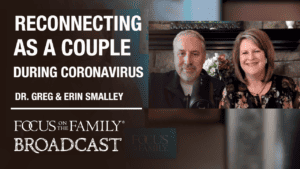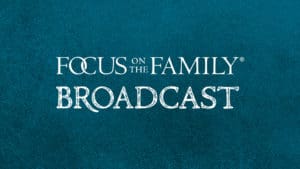Marci Seither: It’s like that chrysalis moment, you know, the kids are kind of like those little caterpillars. And then pretty soon, they harden up and you can kind of see the transformation. You see their wings starting to change, and pretty soon… And I was watching this one day after a science experiment with our kids. And one by one, the caterpillars started coming out of their chrysalises and they had these wrinkled little wings and they started flapping ’em. And one caterpillar was struggling. He was really struggling, and it was so tempting to just reach over and wanna peel that off of the butterfly. But if we did that, it would kill it. It would never get to where it was supposed to go. And so I just sometimes think that that’s actually what the Lord does for us.
John Fuller: That’s Marci Seither and she’s our guest today on Focus on the Family with Jim Daly, talking about ways to prepare for the empty nest years. Thanks for joining us. I’m John Fuller.
Jim Daly: John, I’m looking forward to the discussion. But before we get started, I wanna invite folks, um, the listeners and the viewers to visit us here at Focus on the Family in Colorado Springs, uh, as you’re making your summer vacation plans. We’ve got a lot to offer here. We’ve got a great welcome center and a wonderful bookstore. And, uh, man, we got play areas galore over there.
John: Mm-hmm.
Jim: And we just wanna make sure people are aware of it. Usually, about a hundred to 200,000 people come and visit with us, uh, throughout the year.
John: Mm-hmm.
Jim: So we wanna make sure you know about it. And it’s a beautiful area here in Colorado. Uh, that said, I know the message today’s gonna touch your heart. It’s definitely close to mine. We’ve, uh, launched Trent. He’s been out for quite some time.
John: Mm-hmm.
Jim: And Troy is making his moves. So we’re within inches of that empty nest moment.
John: Yeah. And it, it comes in stops and stutters it seems.
Jim: (laughs)
John: So we’ve had kids bounce back. I’ve got one daughter, Jim, who thinks it is the sign of a loser to move back home. She’s not doing it. She’s fled the coop, but she does not wanna come back. And others feel like that’s a safe place.
Jim: Well, I know some, uh, folks, I looked at some of that data, many more young people have to live at home longer-
John: Mm-hmm.
Jim: … because of finances.
John: Yeah.
Jim: You can’t buy a home today, rent is high, all the expenses. So we get it. And there’s no shame in that, but, uh, it is the goal.
John: Mm.
Jim: And we’re gonna talk about that today.
John: Mm-hmm. Yeah. And Marci Seither is a, uh, creative storyteller. You’re going to hear how she raised and launched six children. And, uh-
Jim: Yay.
John: … this is a recorded conversation. When we had the, the initial discussion, she still had one or two kids at home. And, uh, now she’s a proud grandmother of seven. And the book is called Empty Nest: Strategies to Help Your Kids Take Flight. And, uh, you can find out more about Marci and this terrific book at focusonthefamily.com/broadcast. And Jim, we’re gonna pick it up as you welcome Marci to the program.
Jim: Marci, welcome to Focus on the Family.
Marci: Thank you so much for having me. This is really a thrill. (laughs)
Jim: I’m hoping people are like leaning into the radio or the podcast, however they’re listening right now, because this is really important stuff. Jean and I, I’m thinking about this when I lay my head on my pillow at night. How are we gonna launch Trent and Troy well? There are some strategies you can think about, right? You’ve done this with five of your six kids.
Marci: Mm-hmm.
Jim: What’s the number one thing we gotta be mindful of?
Marci: Uh, I would have to say the number one thing to be mindful of is to know early on that you are a steward of your kids, not an owner of your kids.
Jim: Huh.
Marci: That makes a huge difference because it changes how we feel about our kids’, um, goals and aspirations. When we wanna take ownership, it’s really hard to let go of something that we own versus something that we are just raising for the Lord.
Jim: Let me press you to give me-
Marci: Yeah.
Jim: … some adjectives, because I’m sure parents, we get a little, uh, blinded by what’s ownership and what’s stewardship because, you know, we care about our kids. Describe for me those little adjectives that help describe an ownership-oriented parent and a stewardship-oriented parent.
Marci: I think, uh, the difference is in an ownership situation, which it’s so hard because you have this baby that you are in charge of taking care of, they can’t take care of themselves. And it’s all about you helping them from day one. And then all of a sudden, and you’ve had all this time to what to expect when you’re expecting-
John: Mm-hmm.
Marci: … and nine months to prepare. And then when they get ready to launch, you have nothing practically. They just leave. And it’s really-
Jim: You don’t have joy?
Marci: You do have joy.
Jim: I’m thinking joy is in my future.
Marci: You don’t have-
Jim: (laughs)
John: (laughs)
Jim: Hey by the way, I love my kids.
Marci: You don’t have a thick book to help you walk through-
Jim: Yeah, that’s fair.
Marci: … those steps. You know?
Jim: Yeah. That’s fair.
Marci: And so, um, when you have an ownership situation, I think it’s the parents who really have a hard time letting go. Those are the helicopter parents who just want to kind of impose like, “This is what we’re gonna do, this is what you’re gonna do.” And it, the failure of their kids is so scary because they are going to reflect that as failure on themselves.
Jim: Yeah. We wanna get into that, ’cause I think that’s huge.
Marci: Yeah.
Jim: But what are the, those emotions and thoughts we face when we’re launching our children? Speak as the mom. I mean, what are those feelings like? What do you think about, failure? Do you think about the fact their grades weren’t good enough in high school? How are they ever gonna succeed in the world? I’m not speaking from experience here.
Marci: (laughs)
John: You have a friend, right?
Jim: (laughs) I have a friend.
John: (laughs)
Jim: Now, what are those thoughts that you’re, uh, contemplating, you know, when the 18th, 19th birthday arrives and they’re actually heading off to something, college or vocational school, whatever it might be?
Marci: Well, I think it’s good to be knowing in advance that it’s going to be a transition for you. Because sometimes I think that kind of catches us off guard that this is a transition for your kids, but it’s a transition for you as well. And I know that’s the part that caught me off guard and that’s why I wrote the book because I thought I need something when our first kid leaves. I don’t need to know what to do with the spare room when the last one leaves.
Jim: (laughs)
Marci: I need to know how to handle this empty hole in my heart when this kid leaves. And we had actually two leave close to each other, ’cause we had one go into the military and Emma ended up graduating early and going to Saipan for six months. So we had back-to-back leaving. And I wasn’t really prepared for that and I wasn’t prepared to help our kids with that. And so I think just as far as, um, strategies is to just prepare yourself that this is gonna be a transition. And I think sometimes we feel like anything that makes us feel uncomfortable is bad. But it, that’s just life.
Jim: So what you’re saying, and I wanna make sure I’m hearing you correctly, that there’s a grieving process.
Marci: Yeah.
Jim: Uh, when your child is leaving, you’re grieving, the status quo is changing and you’re not gonna be seeing them at the house, you’re not gonna be maybe having dinner together once or twice or more times a week. And that is a grieving process for an engaged parent, whether they be the mom or the dad.
Marci: Right. And so just to be able to acknowledge that, and it’s a joyful time, but it is also a grieving time. And you have kids who are gonna go off and do wonderful things. And then, and this is one of the things I had told somebody was you have kids that you’re gonna cry over because you miss them so much. They’re not gonna be there for dinner. They’re not gonna, it… Movie night will never be the same.
Jim: Because you click with them and you love being around and you enjoy their company.
Marci: Right.
John: Mm-hmm. Yeah.
Marci: And then you’re gonna have sometimes kids that maybe there’s some stress, which is a natural tension. Um, if you’ve ever learned about mommy eagles, (laughs) they feather their nest really well when the babies are born. And then as the babies get older, they start kicking out all the fluffy stuff.
Jim: Yeah. Making it less comfortable.
Marci: Making it less comfortable.
Jim: Little prickly.
Marci: (laughs) And so that the babies kind of perch on the edge. And so you have those times where there’s some stress there. And that’s also a unique pain, the fact that, that that pain will be gone too. That or the stress of-
Jim: Yeah. The stress, the responsibility of the parenting.
Marci: Right. Right.
Jim: In fact, finish the story of the eagles, ’cause I, if people don’t know that story, eventually the parent eagle will push the baby out of the nest and-
Marci: Right.
Jim: … uh, help them to learn to fly very quickly.
Marci: Yeah. So that’s a natural thing. And I think, um, at that point, you know, the mom eagle has had all the down, she’s had everything in there. And then pretty soon, she starts kicking out, um, the cell phone. Um, (laughs) and she starts kicking out the paid car insurance. And then she starts kicking out the gym membership. And pretty soon, (laughs) the little eaglet who now is shaving-
Jim: Has to pay for everything.
Marci: … has to pay for everything. (laughs)
John: (laughs) Yes.
Marci: And so, um, that’s-
Jim: That’s the human version of that.
Marci: Yes.
Jim: That’s good. I like that.
Marci: (laughs)
Jim: You know, you had a wonderful story, uh, you and your husband about a tree that had fallen, and it is a beautiful illustration.
Marci: Mm-hmm.
Jim: If you take anything away from this discussion today, this is gonna be the story. Explain what happened and what you and your husband learned about parenting with that episode of a fallen tree.
Marci: Well, my husband and I lived in Northern California and he had a sawmill, and he was hired to come to somebody’s home. They had this huge tree in their yard and they wanted the tree cut down so that they could use, have that milled up for their lumber package to build an addition to their house.
Jim: Wow.
Marci: So it seemed like a perfect full circle story. And John went and he cut the tree down and it was totally useless.
Jim: And why?
Marci: I, when he told me that the tree, they were just gonna have to probably end up just chipping it and burning it, I was shocked because what he said was that it’s the tight rings that cause strength, and the tree, because it had no issues with having to get water, there was no other trees around it. It had all the sunshine it needed. It was-
Jim: So it was never stress?
Marci: It was never under any stress. It had everything it needed. And so then the tree grew big, it grew lush from the outside, it was the perfect tree, but on the inside, all the rings were really far apart. They were very widely spaced.
Jim: And that makes for a weak piece of wood.
Marci: That’s right. Because when we are under stress, that causes that tight ring. And it is that tight ring that gives it the building structural stability. And sometimes… I was thinking about that with our kids and how sometimes, we want to do whatever we can to avoid stress. And-
Jim: It’s almost the parenting objective today.
Marci: It is. We want to do whatever it is that relieves stress or relieves any discomfort. We wanna make sure that they have everything they need. And yet then we also pray on the other hand, just help them be useful. Well, in doing so, sometimes we have created an environment where there is no tight rings. And it is in those tight ring years that really we learned the most about our kids, about ourselves. And I know when our son was, he was going to Afghanistan, and I remember looking at my husband and telling him, “This is a tight ring year.” And so-
John: And this was with the military.
Jim: I love that language. I love that language of the tight rings. I mean, I’m… Jean and I, we’re gonna start praying that way, “Lord help us to provide tight rings for our kids.” But in that context, with your son leaving, he had announced he was gonna join the Marines. He did it and he was off to combat, right?
Marci: Yeah. He was in the, um, two seven fast company and, um, there was over 20 guys that did not come back from his tour.
John: Mm-hmm.
Marci: And it was a difficult situation. There was actually a time where we didn’t hear from our kids for over, it was several days where nobody heard anything. And it was kind of a place where there was no ground support, no air support. It was back in the wild west. And, um, we actually saw something on the news that came through that said that there was, um, two men down who were machine gunners from that unit. And names would be released once the families were notified. And you have to wait.
Jim: You just wait.
Marci: And you’re just thinking, as you’re folding laundry, “Is this my tight ring moment? Like, is this the time? And do I have what it takes to go answer the front door if the black sedan shows up? Or will I run screaming out the back door?” Like your tight ring is the thing that really, in the end, lets you know that God is still in control. And as much as we love our kids, we have to trust that God loves them more. As much as we wanna hold our kids, we have to trust that God’s hands are bigger than ours. And I think if we think that we’re gonna go through life without any tight ring years, then you can pretty much guarantee that you’ll be just like that tree.
John: Mm-hmm.
Marci: You’re not gonna be structurally sound and neither are your kids.
John: Yeah.
Marci: And the other thing is, sometimes your kids make decisions apart from you when they’re grown, that cause you to have a tight ring year, even if they don’t.
Jim: Yeah.
Marci: And you have to accept that as being okay as well.
Jim: Boy, that’s putting a shutter through a lot of parents right now, that, you know, be expecting the Lord particularly to put tight rings in you and in your children because those tight rings, like a tree, make you stronger.
John: Yeah. And our trust is in the Lord. I so appreciate the wisdom from Marci Seither, and you can get her book Empty Nest: Strategies to Help Your Kids Take Flight, uh, over at our website. We also have a CD or a download of, uh, this conversation as well. That’s focusonthefamily.com/broadcast, or call 800 the letter A and the word FAMILY.
Jim: Marci, you touched on this a moment ago and I promised to bring it back up. And this is the idea that we as parents, we tend to gain significance through our children.
Marci: Mm-hmm.
Jim: If they’re well-behaved, if they’re the honor roll, I mean, we have bumper stickers that say, “My kid’s an honor roll student.” Right?
Marci: Mm-hmm.
Jim: And we love that. We love when our children are achieving and they’re living life well, and I think especially, uh, in the Christian community, we want to see good behavior, uh, good grades, all those things. And we take a lot of pride in that. Where does that become unhealthy, uh, in this moment when you’re trying to launch?
John: Mm-hmm.
Jim: When you’ve taken that kind of personal interest in the development of your child? Rightfully so. I mean, you’ve tried to help them in mind, spirit, and body.
Marci: Mm-hmm.
Jim: And now you’re saying, “Bye.”
Marci: Yeah. That’s a tough one. And I do just have to say, I think we put it on ourselves. And especially with social media and everybody looks good, everybody acts good, everybody’s doing just the right thing. We’ve got our kids in just the right activities, but sometimes, we are gonna fail. And that is, we’re human. And I think we can learn from that. And, um, our kids are also going to… They might not get the grades that we thought they were going to need to get into the top schools, but if you ask them, that might not actually have been their goal all along. So I think that’s really important to think about. What is the value for our kids? Where is it that their strengths lie? And one of the things that my husband and I used to think of is, it’s so easy to focus on their strengths and really push for that. But it’s so important to know that every strength has a weakness. And if they can learn to master their weakness, that will help them develop their strengths. So in helping our own kids, but for us to take it personal, that is really hard because when things don’t go well, we wonder what we did wrong, where we went wrong, but that when things go well, we think, “Oh, look what we did right.” (laughs)
John: (laughs)
Jim: (laughs) And it’s completely natural to have that.
Marci: It is.
Jim: Um, let’s put the focus on the parents for a moment. So the children are launching, um-
John: Mm.
Jim: What is important for the marriage to survive? I think, uh, I’ve referred to this several times over the last year or two. I think it was a Wall Street Journal article that talked about the graying of divorce and that women are filing at a much higher rate as empty nest years come, uh, because they have lost their significance and they don’t love their husbands anymore. And again, that’s a generalization. I get that. But that was the article.
Marci: Mm-hmm.
Jim: The graying of America divorce. What is happening in that moment and what can couples do to stay together and remember there’s more to life than child-rearing?
Marci: Um, I think one of the things for moms, especially like we did homeschool our kids until they were partway through school, and it’s very easy to not have everything kind of run together. But it’s very important, I feel, for especially moms who are with their kids day in and day out, to have things that they are also growing as well in their own life.
Jim: Um, when you say that, what’s the thing? Hobbies, or what, what do you mean?
Marci: Yeah, whatever it is. I mean, you can… Just to stay interesting. I know when our daughter was getting married, I said, “Okay, can I tell you? So us Seither women, here is what the secret for a good, um, healthy marriage.” And Emma was like, “I don’t wanna hear this.” (laughs)
Jim: This is your daughter Emma?
Marci: Yes. I said-
Jim: (laughs) “Stop talking to me.”
Marci: “Stop talking to me right now.” (laughs) I said, “You have to stay interesting. If you’re not interesting for yourself, you’re not gonna be interesting for your spouse.”
John: Hmm.
Marci: And I think sometimes, especially moms, it’s really easy when that becomes your identity to just be so immersed in your kids’ identity that you lose yourself in that and to not be growing something besides that, whether it’s hobbies or whether it’s just, um, academics. There’s something you can always be learning or doing and it’s healthy for your kids. And, um, several years ago, my sister signed me up with her to do a triathlon.
John: Oh.
Marci: And (laughs)-
Jim: (laughs) Good for your sister.
Marci: Yeah.
John: Nice of her.
Jim: If my brother ever did that to me, I’d kill him.
John: Okay.
Jim: (laughs)
Marci: Yeah. Well, uh, that was before I saw the bike route. (laughs)
Jim: (laughs)
Marci: So it was a sprint triathlon, but it was a high elevation. It was at Donner Summit.
Jim: Oh my goodness.
Marci: And so I thought, okay, well, you know, I am a swim-
Jim: (laughs)
Marci: I was a swim instructor at the time and a lifeguard.
Jim: Okay.
Marci: So the swimming is okay, the bike riding, um-
John: How hard can it be?
Marci: I’ve ridden a bike once or twice.
Jim: You can get through it.
Marci: And then, um, running, if I have to stop, drop and roll the last third of a mile, I still get the T-shirt. So I’m good with that.
Jim: (laughs)
Marci: (laughs) And so, um, I began training for this triathlon and every day, I would get up really early and I would train and train and finally the day of the race came and I had all my gear and I had everything set just right. And my daughter said, “Gosh, mom, I just have to tell you I’m really proud of you.” She said, “You’re not even all that athletic.” (laughs)
Jim: (laughs)
John: Oh.
Jim: How’d that feel?
John: (laughs)
Marci: (laughs) I said, “You know, I’m really proud of myself.” I said, “You know, someday,” I said, “I want you to remember this moment right now, how you feel about me and how I feel about me. Because someday you’re gonna be a mom and you’re gonna have to do things that take you out of your comfort zone. It might not be a triathlon, it’ll be something different, but you’re going to have to stretch yourself beyond what you thought you could and you’re gonna just know that, you know, you’re gonna be okay and get the t-shirt.”
Jim: And that’s a beautiful story about that connection. Uh, with respect to your husband, what are some of the strategies that you’ve deployed to stay interesting and be connected at that point of launch? Because again, I think particularly a mom can justify that involvement with the children. Listen, my whole goal is to-
Marci: Mm-hmm.
Jim: … help my child love the Lord, to do well academically-
Marci: Mm-hmm.
Jim: … or do well vocationally, whatever that may be. And to do well physically, you know, to be in good shape and not to eat stupidly.
Marci: (laughs)
Jim: (laughs) And that’s a challenge when you have all boys, but-
Marci: Oh, yeah.
Jim: Uh, but you know, you can really justify that over-involvement. So how do you back out of that at the moment of launch and say to your husband, “Okay, hold me accountable.” Is that something you did? Did your husband say, “Okay, let me point out some things to you that could be a little dangerous.”
John: That sounds like a really dangerous tactic.
Jim: That’s a recipe for disaster.
Marci: Yeah. (laughs)
John: (laughs)
Jim: But I mean, date nights, and, “Let’s take a weekend,” uh, sometimes moms fret over that kind of thing. Are you sure we can leave our 18-year-old? (laughs)
Marci: Yeah.
Jim: I mean that’s true.
Marci: Well, we did tell our kids that they were allowed to tattle on each other if mom and dad were both gone. (laughs) So-
Jim: There’s a strategy.
Marci: So that, you know, there was safety in numbers as far as that goes, but I think the biggest thing that you have to think of is long term. And if you’re wanting your children to have a good healthy marriage, you need to be doing that as well.
John: Mm-hmm.
Marci: And so my husband and I were in a 21-piece Glenn Miller tribute band for a while.
Jim: Whose idea was that, by the way?
Marci: Um, he was a saxophone player.
Jim: Oh.
Marci: So it was him-
Jim: Okay.
Marci: … that got recruited and then I ended up joining as a vocalist. And so we did that for a while when we were in Northern California. And-
Jim: So find a common interest.
Marci: Yeah.
Jim: Could be hiking, something a little less rigorous, maybe. (laughs)
Marci: Yeah. Yeah. Just do something different, um, with each other.
Jim: Yeah. That’s a good idea.
Marci: So-
John: Uh, Marci, like you, we have six kids and as I noted at the top, there is, um, an element of fluidity to how many kids we have in the home-
Marci: (laughs)
John: … depending on the week. Um, what’s your advice for parents when a child says, “Hey, can I come back for a while?”
Jim: And is it… Let me just add to that. Is it different at 24 from 34?
Marci: Well, our 34-year-old hasn’t moved back in, (laughs) so, um, but he’s 31, so we still have a couple years, I guess for him to (laughs)-
Jim: (laughs) Well, I’m being arbitrary.
Marci: Okay. So, um, I think the biggest thing is that parents need to set boundaries for any age because it is still their home. And so you need to… Like, just because they were gone, like we had a son who was in the Marines and then when he came home, he still needed to let us know if he wasn’t coming home, you know?
John: Mm.
Marci: Like he didn’t have a curfew.
Jim: So he stayed with you for a while until he got-
Marci: Yes.
Jim: … back up on his feet.
Marci: Right.
Jim: And found a job and those things.
Marci: Mm-hmm. But, so we still had some household rules that we adhered to, even though, um, it would be different than when he was younger.
Jim: Yeah. That can include, you have him pay some rent.
Marci: Mm-hmm.
Jim: You have him pay some food costs. I mean, you have them responsible, back to the eagle’s nest, right?
Marci: Mm-hmm.
Jim: These are the feathers you’re pulling out.
Marci: Mm-hmm.
Jim: If you deployed those strategies-
John: Well, yeah. We have a, we have a rental form, uh, that-
Jim: (laughs)
John: … that I’ve drawn up for my kids and I’ve actually shared it with some other parents. And you have to have that conversation in my experience before the child moves back.
Marci: Mm-hmm.
John: Otherwise, months go by and it gets awkward.
Jim: So have you ever served an eviction notice?
John: Uh, no.
Jim: (laughs)
John: We just make it highly uncomfortable to stick around. How’s that?
Jim: (laughs) No. I mean, those are good things to think about.
John: It’s good to get it on the table at the front end of this situation.
Marci: Right.
Jim: Absolutely.
John: Yeah.
Jim: Uh, Marci, I, I don’t want to end the time together without the description you gave in the book about helping the siblings cope with the loss-
John: Mm.
Jim: … of a brother or sister-
Marci: Mm-hmm.
Jim: … who’s moving outta the home. ’cause it changes the dynamic of the home. And you mentioned when Nathan, I think your son, was leaving, you found solace in roller coasters. (laughs) Now, I’m not sure how all that fits together. Please tell me.
Marci: Well, sometimes life first of all feels like a roller coaster, especially when you have six kids. But, um, I have to say, when our oldest ones were leaving, there’s something, when you can do something together for all the kids, that was one of the reasons I wanted to go to a theme park with all the kids so that we could all enjoy something together. And that was a difficult time because our youngest was only, he was going into first grade-
Jim: Right.
Marci: … when his oldest one was leaving.
John: Leaving the house.
Marci: And so it’s so important to have family memories that will be retained by everybody.
Jim: Huh.
Marci: Even though the memory’s gonna be a little bit different, it’s really important to create family memories that will be intact for each of those family members as the time goes on.
John: Mm-hmm.
Marci: Um, when Nathan would graduate from boot camp, we would keep that as that celebration. We wouldn’t combine it with other celebrations or, um, when he came home from the service, we would make sure that we had some family time only before all the friends and families came.
Jim: Um, what are some of those emotions that siblings can have? I mean, that you have to be mindful of as a parent. ‘Cause sometimes you can, you know, you’re so busy and distracted that you don’t see that maybe the middle child or the youngest child, like in your case, a first-grader, is missing their older brother.
Marci: Yeah. I think that that caught me off guard. I was expecting, like, I took up stress knitting when-
Jim: Stress knitting.
John: Stress knitting.
Marci: Stress knitting.
John: (laughs)
Jim: (laughs)
Marci: (laughs) When, uh, Nathan joined the service and Emma left. And, um, I, everyone got scarves that year. I mean, people I didn’t even know got scarves.
John: (laughs)
Jim: (laughs)
Marci: (laughs)
Jim: Mailman, everybody.
Marci: Yeah. Everyone. Yeah. I even asked my husband, “Is there a needle recycling program?”
Jim: (laughs)
Marci: He’s like, “Not those needles, honey.”
Jim: Right.
Marci: So I mean, he would just hear the click, click, click. And, um, but I think that we need to be prepared to have some time that we can help our younger kids. And there was a time when our youngest son was, he was in first grade and Nathan had come home and then left again. And then he had come home. He was getting ready to leave again and our first-grader was in a charter school and the teacher said, “I’ve never had this happen but he’s not reading anymore.”
Jim: Huh.
Marci: He had started going backwards-
John: So he regressed.
Marci: … really fast.
John: Huh.
Marci: She’s like, “I don’t even know how to help him. Is there… Maybe you should pray about what you should do over Christmas vacation.” And I just knew, I said, “You know what? I appreciate that, but I think that I, I can make a decision on this right now.” And I just said, “I think I need to just take his books home and we’re gonna, I’m gonna catch him up and we’re gonna spend time together and we’re gonna process through this emotionally and educationally, and then he can join the class again next year.”
Jim: Did he open up to you in that way? Did he say, you know-
Marci: He couldn’t verbalize, and so I think it’s really important for parents just to, um, it’s a case-by-case situation. You never know. And a first-grader can’t say, “Wow, I’m really nervous about Nathan,” but all of a sudden, things are going on and it’s okay for parents just to say, “You know what? Clear my schedule. I’m staying home with you.”
Jim: Yeah.
Marci: And so I stayed home with him. I called it full contact phonics because he basically had to be touching somebody all the time.
Jim: Oh my. Yeah.
Marci: He just needed that-
Jim: But that’s attentive. I mean, that’s knowing-
John: Mm.
Jim: … your child.
Marci: And then-
Jim: I, I like that.
Marci: Well, and then the following year, so then he went back to school, he was all caught up. And then the following year when Nathan was gonna be going away again, um, Jack said, “Gosh, mom, I’m feeling that feeling again.” I said, “You know what, buddy? We already processed through this, so this time, instead of staying home for a half a year, I’m gonna keep you home for one extra day and we’re gonna bake cookies for Nathan’s unit, the two of us, and then you’ll be ready to go to school.” It’s a hard situation. I think acknowledging that it’s hard for your kids-
Jim: Right.
Marci: … is important because sometimes, we want to internalize stuff and we don’t acknowledge how hard it is for us.
Jim: Yeah.
Marci: And when we’re not honest about our own emotions, then that’s really hard to pass that on to our kids, that this is hard.
Jim: So true. It is. And Marci, you have done a wonderful job with this book, Empty Nest: Strategies to Help Your Kids Take Flight. Um, it’s full of stories and full of great ideas about not only how to launch your children, how to stay connected in your marriage-
Marci: Mm-hmm.
Jim: … how to be mindful of siblings and the grief they’re feeling with the loss of a sibling who’s leaving the home.
Marci: Mm-hmm.
Jim: And, uh, I love it. I mean, the timing’s right for Jean and for me (laughs) because we are living the dream.
Marci: (laughs)
Jim: True for you too, John. And I just think it’s a wonderful tool to put in, in your hands if you are living in that spot too. And this might be you have a 10, 11, 12 year olds, you’re, it’s gonna come a lot faster than you realize.
John: Mm-hmm.
Jim: So I would encourage you to get Marci’s book. You can get it here through Focus on the Family, and really for a gift of any amount, uh, that’s how much we believe in that resource, uh, to help equip you as a parent. Uh, if you can help us help others, we’ll send it along to you as our way of saying thank you.
John: Yeah. And you can make that donation and help Focus on the Family reach others, and, uh, we’ll send a complimentary copy of Empty Nest to you. Just, uh, donate online at focusonthefamily.com/broadcast or call 800 the letter A and the word FAMILY, 800-232-6459. On behalf of Jim Daly and the entire team, thanks for joining us today for Focus on the Family. I’m John Fuller, inviting you back as we once more help you and your family thrive in Christ.



















